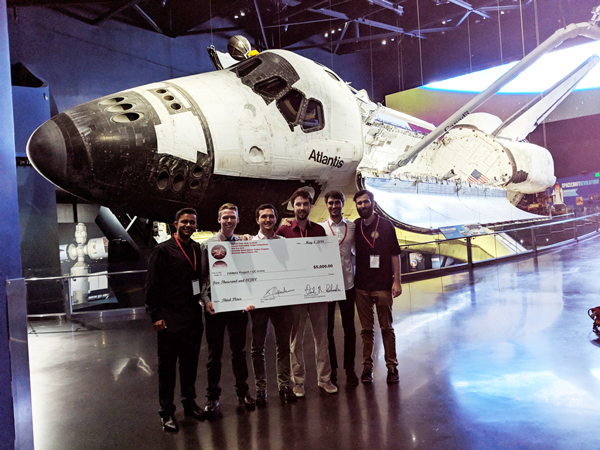Quadflappers Take Third in Cornell Cup

June 5, 2019 - Samueli School engineering students who are building a Flapping-Wing Micro Air Vehicle (FWMAV) won third place and $5,000 in the Cornell Cup competition at the NASA Kennedy Space Center Visitor Center in Florida last month.
Eighty-one teams from the United States and Canada competed in the Cornell Cup, a national competition that tasks applicants with solving a real-world problem in a unique and interesting way. The competition provides engineering undergraduate students a chance to win up to $10,000 in prize money and highlight their ideas nationally.
Inspired by the agility, maneuverability and stability of insects, the FWMAV project is under the guidance of Haithem Taha, an assistant professor of mechanical and aerospace engineering. Taha’s research involving rigorous mathematical modeling and analysis of insect flight dynamics revealed a hidden stabilization mechanism that insects unconsciously exploit during flight. The natural oscillations of their wings (needed for keeping the insect aloft) provide flight stability without feedback via a phenomenon called vibrational stabilization.
A subteam who call themselves the Quadflappers is the group that competed in the Cornell Cup. Their device uses a traditional quadcopter design, but instead of spinning propellers, it has four sets of ornithopter wings. It has the same maneuverability and performance of a quadcopter but without the noise and hazards of spinning blades.
Sam Hince, a sophomore and one of the pilots of the device, thought the competition was an especially good fit. “It was great to meet a lot of people from around the country, all studying the same thing,” said Hince, who was on the team last year as well. “We also met and talked with people from industry and NASA.”
Hince said it was especially fun to show their quadflapper to public viewers, including children, who came through the exhibit space, and they even showed some of them how to fly the device. “We held a small contest to let others try it out. It makes a fun toy, and is so much safer than anything with propellers.”
This year’s team is the Samueli School’s fourth to work on this project, which started in the 2015-16 academic year. The Quadflapper group also won first place in the UCI campuswide Beall and Butterworth competition last spring ($10,000). They published a paper in the AIAA conference, and are currently filing a patent on this novel bioinspired flying concept.
“This year’s FWMAV team in general and the Quadflapper subteam in particular is a harmonious blend of talented and passionate students,” said Taha. “I'm very lucky to have such a team in my lab and I am very proud of them.”
– Lori Brandt
